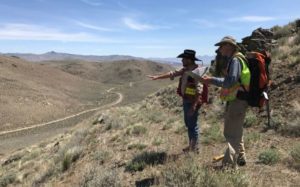Silver Range and Trifecta Gold report high Nevada gold assays


Silver Range Resources Ltd. [SNG-TSX] announced results from initial exploration work on the Yuge property with partner Trifecta Gold Ltd. [TG-TSXV; TRRFF-OTC]. Silver Range granted Trifecta a staged option to earn up to a 75% interest in the Yuge property as announced February 28, 2018.
The Yuge property is located in Humboldt County, northern Nevada, approximately 55 km south of Denio in the Varyville Mining District. The property covers the historical Columbia and Juanita Mines, which produced high-grade gold on a small scale between 1870 and 1937, from strong veins located more than 1,000 metres apart within the same structural corridor. Previous mining only extended down to the bottom of the oxidized zone. Diamond drilling by previous operators below the Columbia workings produced a true-width sulphide intersect, grading 9.70 g/t gold over 3.3 metres, starting 49 metres below surface.
An initial reconnaissance program managed by Silver Range in late April and early May focused on three zones – Columbia, Juanita and Josie. A total of 68 rock geochemical samples were collected during the program; 35 of the 68 rock and/or chip samples collected returned greater than 1 g/t gold. Significant rock sample results are listed below and a map showing their locations is available on Silver Range’s website.
- Columbia – 150, 75.4, 34.9, 10.5, 7.4, and 7.13 g/t gold
- Juanita – 11.4, 6.35, and 5.85 g/t gold
- Josie – 86.1, 45.2, 42.2, 36.2, 25.7, 21.6, 16.7, 13.1, and 5.49 g/t gold
“Results from our preliminary work at Yuge are extremely positive,” stated Dylan Wallinger, Trifecta’s President and CEO. “We have confirmed the presence of high-grade gold mineralization at and adjacent to the historical mines, and have also identified a potential bulk-tonnage target that was not recognized by previous workers.”
Gold mineralization occurs with sulphides (arsenopyrite and pyrite) or their weathered products (scorodite and iron oxides). Only minor amounts of quartz or silica accompany the mineralization. The veins are found in fault/shear zones that cut andesites, andesitic epiclastics and diorites, but seem to be best developed within and on the margins of mapped diorite intrusions.
The Josie target is a large area located south of the former Juanita Mine that contains scattered historical diggings, which Trifecta is evaluating for its bulk tonnage potential. Mineralization at the Josie target was collected over a 500-metre long by up to 200-metre wide area, from structures that trend oblique to the Columbia/Juanita system. Most samples at Josie were taken from vein exposures or float, but a 2-metre chip sample, mapped as weathered ‘andesite’ with minor iron oxide, contained 1.84 g/t gold. Vein exposures in partially collapsed trenches graded up to 45.2 g/t gold over 0.35 metres and 42.2 g/t gold over 0.4 metres. The limits of the Josie target have not been defined.
At Columbia, multiple grab samples grading greater than 5 g/t gold were collected from a series of trenches over a strike length of 65 metres. Soil samples were collected on a test line over an undisturbed section of the Columbia Vein to determine the effectiveness of soil sampling on the property. Peak values were 7.2 g/t gold-in-soil, 6.18 g/t silver-in-soil and 8,050 ppm arsenic-in-soil. Results from the initial program indicate that gold mineralization at Yuge is more widespread than documented in the limited historical data and may occur in hitherto undocumented structural settings.
In response to these positive results, additional claims have been staked, more than doubling the size of the property. In addition, an airborne total magnetic field and radiometric survey was completed by Precision GeoSurveys Inc. Further work will include a program of geological mapping focused on structure, additional prospecting, systematic soil sampling, and alteration (Short-Wave Infrared) mapping, followed by trenching and ground geophysical surveys to define drill targets.
